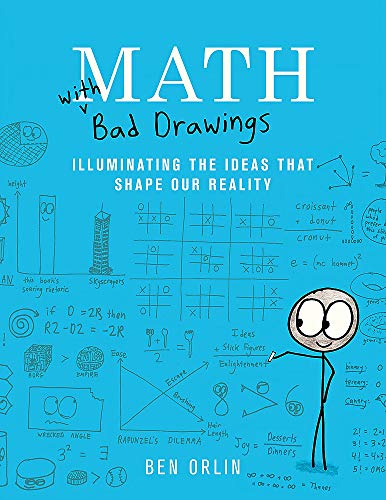
1
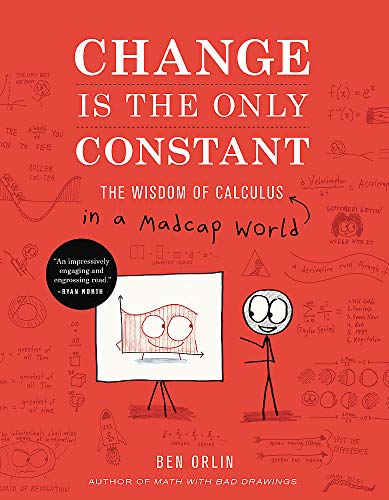
2
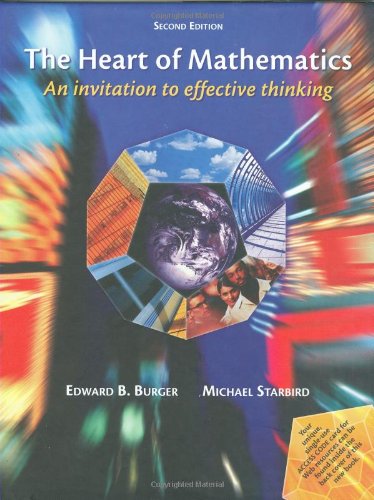
3
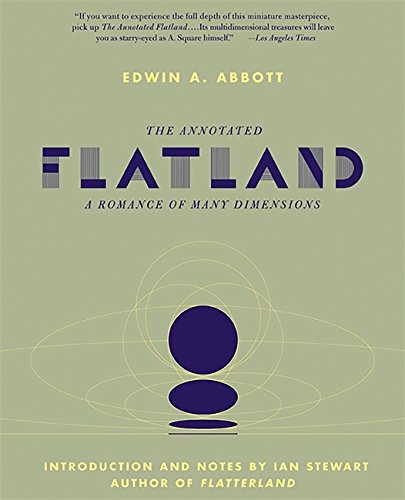
4
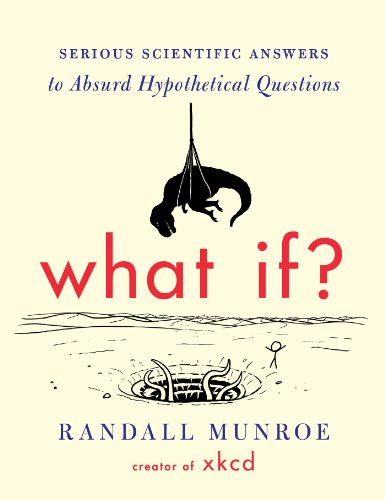
5
I’ve struggled with math all my life, but I can’t seem to leave it alone – and I’ve needed to make peace with it, at least at a basic level, to study the science I’m interested in. Most math books just leave me annoyed, even the “fun” ones written for non-mathematicians. However, there is hope: I’ve found a few books that either present math in a way I can understand (or at least tolerate), or they brush up against math while going into non-mathy topics in humorous ways. This reduces my panic about math by helping me make friends with it.
1
I became aware of Ben Orlin while taking a mooc on mathematical thinking; his essay "What it Feels Like to be Bad at Math" was recommended, and I bonded with him instantly because of that. Ben is a math teacher, and understands the feeling from both sides. His book doesn't require any mathematical knowledge, and doesn't present any quizzes or advice on how to solve problems; it's about European paper sizes, and the Star Wars Death Star, and the lottery, and sports statistics (maybe the most mathy part of the book), and tic-tac-toe. Technically, it's about how math shows up in all kinds of ways in our lives, but shhhh, don't tell anyone and they'll just enjoy the reading. It's beautifully illustrated (in color! If you appreciate book production, this one is a special treat) and uses wise-cracking humor ("We Built This City on Triangles") that reduces the mathphobic anxiety.
2
If Ben's first book was about math without being about math, this one is about calculus without requiring a single calculation. It's about a brief discussion in the teacher's lounge that turned into wisdom, a weird bicycle puzzle, an ancient text, and the calculus of history (my favorite chapter). And again, it's all so entertaining, you forget it's all revolving around calculus, which you may or may not know anything at all about. Full disclosure: one of the reasons I so love this book in particular is my place in the acknowledgements; I was lucky enough to see an advance copy (which was very, very different from the finished book) so I ended up in a math book. Me! Imagine that - anything's possible with these math-for-non-mathy-people books!
3
I got this book several years ago when I took Prof. Starbird's mooc "Effective Thinking Through Mathematics" and found it to be a very different way of looking at math. Instead of examples of calculations and how-to lessons followed by exercises (shudder) I found, first, an invitation to skip around and check out what interested me. Did I want to find out how the ancients viewed math? Learn about knots? Understand strange things like fractals and chaos? Go ahead, here's the page. Being, alas, a traditionalist, I wanted to start with Chapter 1, and found... a series of puzzles. The focus is on ways to approach problems when you're not sure what to do, rather on remembering the method for factoring polynomials. I can't say I understood everything, but it definitely helped with my fear of math.
4
Flatland has been popularized several times in short films and games, but the original is worth reading. The first part is a social critique of late Victorian British education, particularly as it pertained to women (which was very little). The second part investigates the idea of four dimensions in a very concrete way: by introducing a three-dimensional character into the two-dimensional world already created in the first part. Stewart adds historical, social, and biographical information, as well as mathematical explanations, that update the work and give the reader both an enjoyable read and a more contemporary idea of what Abbott was going for.
5
I spent a long time contemplating what the fifth book should be. Numerous mathematicians have written "math for everyone" books, but... well, I'm not everyone, I guess, and while I appreciate those books (and am very fond of some of the authors from following them on Twitter), they don't make me smile or want to read them more than once. Was there really no fifth book? Would I have to resort to "see, I really am bad at math" and make a joke of it, though it would be silly for even me to claim I can't count to five? I went through my bookshelves and found this one. It's really a science book, but that's close enough, since most of the articles include math of some kind. Yet, it's math you can ignore if you need to, and just contemplate the absurdity of the questions: Would 300 arrows really block the sun? What if giant drains were placed in the oceans, what would the world look like if half the water was lost? What happens if you gather a mole of moles in one place? If you're familiar with Munroe's comic-science site xkcd, you have the general idea of the tone of the book. If you really want to know the answers, he'll tell you, or tell you why he can't tell you, but if you just want to smile, that'll work, too.

1
I became aware of Ben Orlin while taking a mooc on mathematical thinking; his essay "What it Feels Like to be Bad at Math" was recommended, and I bonded with him instantly because of that. Ben is a math teacher, and understands the feeling from both sides. His book doesn't require any mathematical knowledge, and doesn't present any quizzes or advice on how to solve problems; it's about European paper sizes, and the Star Wars Death Star, and the lottery, and sports statistics (maybe the most mathy part of the book), and tic-tac-toe. Technically, it's about how math shows up in all kinds of ways in our lives, but shhhh, don't tell anyone and they'll just enjoy the reading. It's beautifully illustrated (in color! If you appreciate book production, this one is a special treat) and uses wise-cracking humor ("We Built This City on Triangles") that reduces the mathphobic anxiety.

2
If Ben's first book was about math without being about math, this one is about calculus without requiring a single calculation. It's about a brief discussion in the teacher's lounge that turned into wisdom, a weird bicycle puzzle, an ancient text, and the calculus of history (my favorite chapter). And again, it's all so entertaining, you forget it's all revolving around calculus, which you may or may not know anything at all about. Full disclosure: one of the reasons I so love this book in particular is my place in the acknowledgements; I was lucky enough to see an advance copy (which was very, very different from the finished book) so I ended up in a math book. Me! Imagine that - anything's possible with these math-for-non-mathy-people books!

3
I got this book several years ago when I took Prof. Starbird's mooc "Effective Thinking Through Mathematics" and found it to be a very different way of looking at math. Instead of examples of calculations and how-to lessons followed by exercises (shudder) I found, first, an invitation to skip around and check out what interested me. Did I want to find out how the ancients viewed math? Learn about knots? Understand strange things like fractals and chaos? Go ahead, here's the page. Being, alas, a traditionalist, I wanted to start with Chapter 1, and found... a series of puzzles. The focus is on ways to approach problems when you're not sure what to do, rather on remembering the method for factoring polynomials. I can't say I understood everything, but it definitely helped with my fear of math.

4
Flatland has been popularized several times in short films and games, but the original is worth reading. The first part is a social critique of late Victorian British education, particularly as it pertained to women (which was very little). The second part investigates the idea of four dimensions in a very concrete way: by introducing a three-dimensional character into the two-dimensional world already created in the first part. Stewart adds historical, social, and biographical information, as well as mathematical explanations, that update the work and give the reader both an enjoyable read and a more contemporary idea of what Abbott was going for.

5
I spent a long time contemplating what the fifth book should be. Numerous mathematicians have written "math for everyone" books, but... well, I'm not everyone, I guess, and while I appreciate those books (and am very fond of some of the authors from following them on Twitter), they don't make me smile or want to read them more than once. Was there really no fifth book? Would I have to resort to "see, I really am bad at math" and make a joke of it, though it would be silly for even me to claim I can't count to five? I went through my bookshelves and found this one. It's really a science book, but that's close enough, since most of the articles include math of some kind. Yet, it's math you can ignore if you need to, and just contemplate the absurdity of the questions: Would 300 arrows really block the sun? What if giant drains were placed in the oceans, what would the world look like if half the water was lost? What happens if you gather a mole of moles in one place? If you're familiar with Munroe's comic-science site xkcd, you have the general idea of the tone of the book. If you really want to know the answers, he'll tell you, or tell you why he can't tell you, but if you just want to smile, that'll work, too.
© Five Books 2024